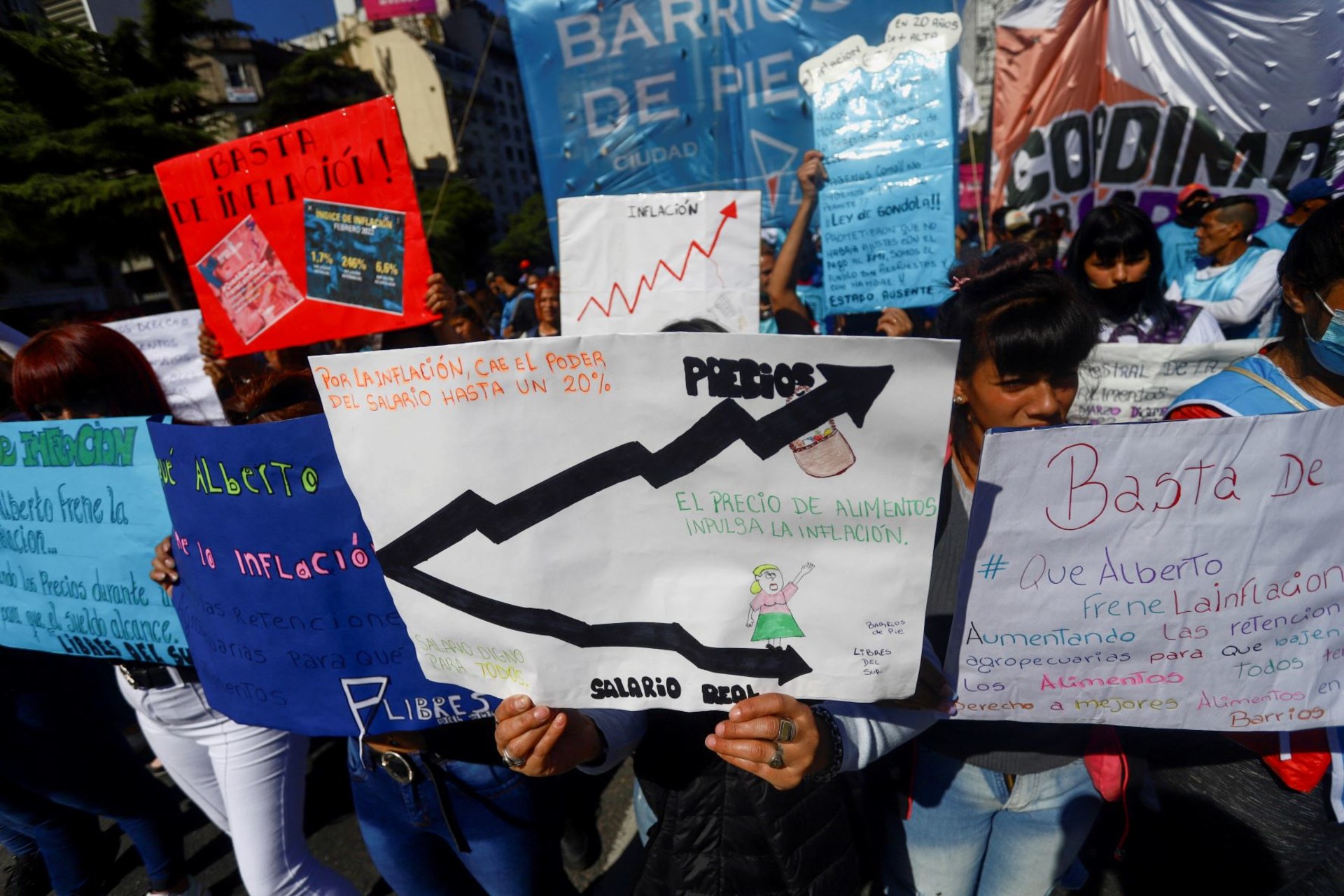The Dangerous New Anti-Globalization Consensus
Soaring inflation is just one reason for Washington to keep global disintegration in check.
Originally published at Foreign Policy

The long-time critics of globalization who warned us that it would end badly are having a told-you-so moment. Porous borders, free trade, and thinly stretched supply chains would make the world more fragile, they cried, leaving countries dangerously vulnerable to disruptions and shocks. It took a protectionist U.S. president, a global pandemic, and a new European war to prove them right.
For decades, the critics were mostly ignored because the benefits of global integration were simply too compelling to those who pulled the levers in government and large corporations. The dissenting voices could only throw a bit of sand in the gears. They forced globalization’s cheerleaders to accept a few minor brakes on unfettered commerce and mobility, such as labor and environmental standards for trade, and tougher border inspections for people and goods.
Now that the disruptions are piling one on top of the other, a new consensus has taken hold in the world’s advanced economies: It’s time to deglobalize. The better path now is to control borders more tightly, build resilient supply chains, pursue self-sufficiency in critical technologies, and inflict trade sanctions on adversaries regardless of global trade rules. But deglobalization has its own long list of costs and dangers, from rising inflation and labor shortages to resurgent protectionism and shocks to the global financial system. Vigorous opposition is needed to highlight those costs and help pull governments back from the more extreme versions of disintegration. It is time for the next generation of critics to find its voice.
Inflation tops the list of new worries. Whatever its downsides, global integration played a starring role in keeping inflation in check for the better part of four decades. The relentless quest by global corporations to shave costs by breaking up supply chains, sourcing from wherever it was cheapest, and using just-in-time production to reduce inventories kept prices for most consumer goods down even as global demand soared. Free trade also forced domestic companies to keep prices lower to compete with imports. From 1980 to 2010, the opening of China, India, and the former Soviet bloc to the global economy doubled the size of the global labor force, creating competition that limited wage growth in advanced economies. Although wage stagnation was hardly a cause for celebration in the United States or Europe, it further limited inflation pressures.
Reversing global integration has predictably raised inflation, especially in the United States. The Trump administration’s trade tariffs—and retaliation by other countries—drove up U.S. prices for lumber, steel, aluminum, solar panels, and household furnishings. The COVID-19 pandemic then brought factory shutdowns, severe border restrictions, and huge consumer demand for goods as the service economy all but shut down, all of which added to inflation pressures. Russia’s invasion of Ukraine and the tough economic sanctions that followed have disrupted energy and food supplies, accelerating price increases for fuel and food around the world. U.S. consumer prices rose 8.5 percent year-over-year in March, the highest since 1981; inflation in Europe is nearly as high and could rise faster in the short term given the uncertainty of Russian oil and gas supplies. Central banks are considering interest rate increases to keep price hikes in check, risking a new recession. Inflation, which has eroded recent wage gains for many workers, is now the top issue for American voters leading into the U.S. midterm elections, which are likely to be a bloodbath for the Democrats.
Throwing globalization into reverse has also forced big changes in corporate strategy. Resilience has become the new buzzword, replacing the just-in-time strategy that led many companies to save costs by reducing inventory and relying on efficient global distribution networks to source components and get products to customers on time. After several years of supply chain disruptions and a new round of COVID-19 lockdowns in China, companies are building up costly inventory to protect themselves. In Canada, for example, warehouse space is nearly exhausted. Montreal Port Authority CEO Martin Imbleau told Bloomberg that companies are now “buying stock not three weeks, not three months, but six months ahead of time and storing it somewhere.” Resilience may be the only sensible strategy in the current global environment, but it will be a costly one for companies and consumers.
Reshoring the production of critical goods, such as medical equipment and semiconductors, is another popular and understandable response to the vulnerabilities exposed by the pandemic and rising geopolitical tensions. A Chinese war on Taiwan, for example, could knock out as much as 90 percent of global production of the world’s most advanced semiconductors. But the costs of reshoring are significant. The U.S. Congress is currently in the final stages of legislation that would throw more than $50 billion of taxpayer money to expand U.S. semiconductor fabrication. Similarly, the European Union is developing its own multibillion-dollar subsidy package aimed at increasing its share of global chip manufacturing from 9 to 20 percent by 2030. The costs are likely to get much larger, since such subsidy programs have a long history of waste, unnecessary duplication, and siphoning off of funds.
Pursuing greater self-sufficiency also comes with other risks that are harder to quantify. When the pandemic spread, for example, nearly every nation in the world turned inward, closing borders to try to keep the virus out. No country did it more thoroughly than China, which has now kept its borders shut for more than two years in what was, at least for a time, a successful strategy to keep out COVID-19 infections. But the pandemic coincided with China’s move away from its decadeslong embrace of the global economy to pursue greater technological autonomy, in part to encourage national innovation and reduce dependence on the United States and other Western countries. It is often a small step from prudent self-sufficiency to damaging attempts at autarky.
China’s so-called zero-COVID strategy has now been overwhelmed by more contagious strains of the virus, leaving the country desperately vulnerable. The Chinese leadership insisted on keeping out foreign mRNA vaccines and using only domestically developed vaccines, despite their lower level of effectiveness against new strains. Although other countries have been able to rely on effective vaccines to avoid lockdowns, China’s most important commercial center, Shanghai, is six weeks into a draconian lockdown and quarantine regime, and the country’s capital, Beijing, may follow soon. Chinese economic growth will take a massive hit this year.
On immigration, the Biden administration has been so terrified of Republican charges that it favors “open borders” that it has moved at a snail’s pace to lift the pandemic border restrictions imposed by former U.S. President Donald Trump. Between 9/11 and the COVID-19 pandemic, it is has become an article of faith that sovereign governments need to maintain tight controls over their borders. Even pro-immigrant presidents like Joe Biden must now genuflect before the mantra of border security. A bolder president might point out that the United States is facing the biggest labor shortage in its modern history, with millions of jobs going unfilled. If pre-pandemic immigration trends had continued, there would have been some 1.8 million more working-age immigrants in the country today, significantly easing that shortage.
Democrats have not even been able to make political mileage out of the recent ludicrous stunt pulled by Texas Gov. Greg Abbott, a Republican hopeful for the 2024 presidential elections. In an effort to reinforce what he claimed were “the Biden administration’s open-border policies [that] have paved the way for dangerous cartels and deadly drugs to pour into the United States,” Abbott set up state inspection sites in early April at border crossings with Mexico. The additional inspections produced border delays of as much as 30 hours, leading to some $240 million in spoiled produce. The political show, which turned up no illegal drugs or migrants, cost the Texas economy an estimated $4.2 billion in all.
Finally, the West’s aggressive use of trade and financial sanctions against Russia—while perfectly defensible given Russia’s brutal invasion of Ukraine—also needs to be scrutinized and critiqued. Western banks have been ordered to freeze some $300 billion in Russian central bank assets, and Russia has been cut off from imports of most Western goods. However necessary, these actions will drive many countries to turn inward even more and seek greater self-sufficiency to protect themselves against being targeted by similar Western actions. Rules that allowed much of the world to benefit from global trade will be further weakened.
The new critics will need to be nuanced. There is no way to roll the world of 2022 back to 1990. The United States and Europe are weaker, China is stronger and bolder, and Russia now seems locked into years of hostility with the West. Nor should the world overestimate the room for policymakers and technocrats to turn the deglobalization ship; governments often have little choice but to go along. Just as globalization was driven by bigger forces, from cheaper ocean shipping to the communications revolution created by the internet, the current era’s deglobalization is being driven by powerful autocrats with territorial ambitions and domestic populists who are hostile to global institutions and connections of any sort. But at the margins, political leaders can choose whether to accelerate these trends—as Trump did in the United States and promoters of Brexit did in Britain—or slow them down.
In devising policies to curb the excesses of the deglobalization bandwagon, the new dissenters will face challenges. Eliminating pandemic immigration restrictions would help ease wage inflation but fuel Republican criticisms in an election year. Many Asian nations are eager for new U.S. initiatives on trade that might help address supply chain challenges, but Democrats are beating the drums for reshoring industry. Russia has said it will challenge the West’s economic sanctions at the World Trade Organization; rather than trying to kick Russia out of the organization, the United States and its partners should welcome the chance to defend the measures as compatible with global trade rules.
Such recommendations will surely be ignored. But the bigger goal should be to raise questions, early and often, about the costs of deglobalization. The coming world may be more resilient, but it will also be poorer, less innovative, more divided, and more prone to conflict. Globalization’s critics played a valuable role for decades, even as they were mostly ignored, by shining a spotlight on wishful thinking by the cheerleaders. The roles have now been reversed.
